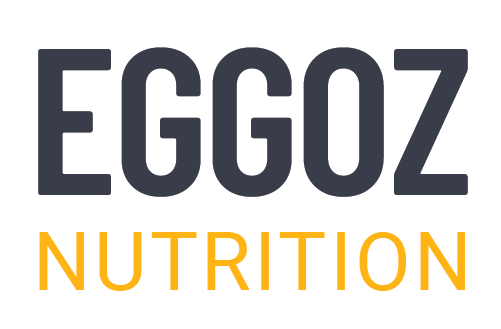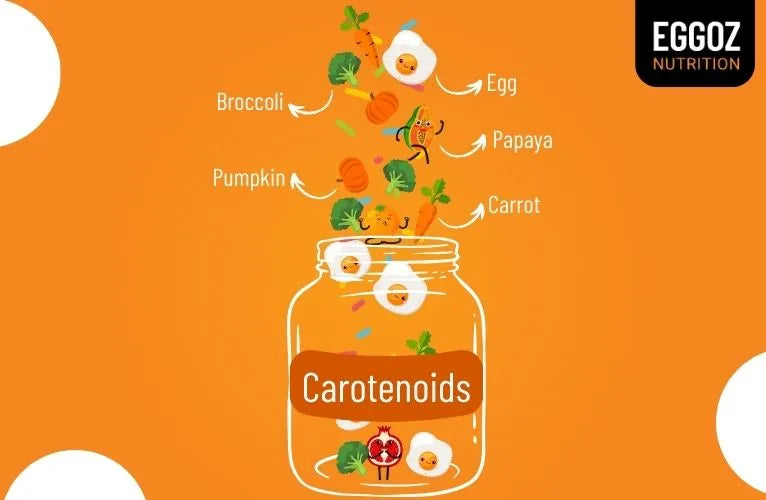Have you ever wondered why a carrot is orange, not blue or green?
Sounds interesting, right?
Well! It's not just a quirk of nature but a clue to a hidden world of nutrition.
Carrots and many other vibrant fruits and vegetables owe their colour to a group of powerful compounds called carotenoids.
But these pigments do more than just paint our produce; they are essential to our health and well-being. Let’s embark on a vibrant journey to explore the world of carotenoids, where colours meet health in a symphony of nature's finest offerings."
Understanding Carotenoids: What Are They?
Carotenoids are organic pigments found in plants, algae, and photosynthetic bacteria. These compounds are responsible for the red, yellow, and orange hues of many fruits and vegetables. Beyond their colour-giving properties, carotenoid food is known for its health benefits, including antioxidant properties and their role as a precursor to Vitamin A.
Types of Carotenoids and Food
Carotenoids are a class of more than 600 naturally occurring pigments synthesised by plants, algae, and photosynthetic bacteria. These pigments absorb light energy for photosynthesis and protect plants against photodamage. In humans, carotenoids rich foods have various biological functions, primarily as antioxidants and as a source of vitamin A. Below are the 4 major types of carotenoids:
Beta-Carotene
Beta-carotene is a precursor to vitamin A known for its immune-boosting and vision-supporting properties. It is predominantly found in orange and dark green vegetables. Beta-carotene-enriched foods include:
- Carrots: One of the richest carotenoids rich foods, providing about 8279 micrograms (µg) of beta-carotene per 100 grams.
- Sweet Potatoes: They contain around 8509 µg per 100 grams.
- Spinach: Offers about 9406 µg of beta-carotene per 100 grams.
- Kale: Approximately 8285 µg per 100 grams.
- Pumpkin: Contains around 3100 µg per 100 grams.
Lycopene
Lycopene is known for its potential to reduce the risk of certain types of cancers and heart disease. It is predominantly found in red and pink fruits and vegetables. Lycopene-enriched foods include:
- Tomatoes: Raw tomatoes provide about 2573 µg of lycopene per 100 grams.
- Watermelon: Contains around 4532 µg per 100 grams.
- Papaya: Offers around 1828 µg per 100 grams.
- Guava: Contains about 5204 µg per 100 grams.
Lutein and Zeaxanthin
These carotenoids rich foods are crucial for eye health, especially in preventing age-related macular degeneration and cataracts. Lutein and zeaxanthin-enriched foods include:
- Kale: High in lutein and zeaxanthin, with about 18,246 µg per 100 grams (majority of its total carotenoid content).
- Spinach raw: Around 12,198 µg per 100 grams.
- Broccoli: Contains about 1121 µg per 100 grams.
- Peas: Around 1079 µg per 100 grams.
- Egg Yolk: Eggs are a unique source, with about 1094 µg per 100 grams of eggs.
Functions of Carotenoids
Carotenoids, a diverse group of naturally occurring pigments in plants, play critical roles in plant biology and human health. Here are four essential functions of carotenoids:
- Antioxidant Activity: One of the primary functions of carotenoids is their role as antioxidants. They can neutralise free radicals, unstable molecules that can cause oxidative stress, leading to cellular damage. This antioxidant property is crucial in preventing the oxidative damage associated with various chronic diseases, including heart disease, certain cancers, and age-related macular degeneration.
- Immune System Support: Carotenoids function enhance the immune system's function. Beta-carotene, for instance, can be converted into vitamin A, a vital nutrient for maintaining a healthy immune system. Vitamin A is essential for the normal functioning of many immune cells, including T cells, B cells, and macrophages.
- Vision Health: Certain carotenoids, specifically lutein and zeaxanthin, are concentrated in the eye's macula, where they are believed to protect against light-induced oxidative damage. These carotenoids filter harmful high-energy blue wavelengths of light and act as antioxidants in the eye, reducing the risk of age-related macular degeneration, a leading cause of blindness in the elderly.
- Carotenoids Benefits for Skin: Carotenoids also play a role in protecting the skin from damage caused by UV radiation. Beta-carotene and lycopene, in particular, are known for their skin protective properties. They help reduce sunburn and UV damage and maintain skin health and appearance.
Role of Carotenoid in Egg Yolks
Carotenoids are relatively stable during the cooking process, although some degradation can occur. For instance, boiling an egg can reduce carotenoid content by about 20%. Carotenoids, the natural pigments found in many plants, are responsible for the bright orange yolk eggs. The most common carotenoids involved in colouring the yolks are lutein, zeaxanthin, and beta-carotene.
When hens consume feeds rich in carotenoids, these pigments are deposited in their ovaries and incorporated into the developing egg yolks. The level and type of carotenoids in the hen's diet determine the yolk's colour intensity. For instance, among the various dietary sources, maize (corn), bajra (millet), soya, rice, and leafy vegetables are excellent choices for enriching hens' diets with carotenoids that contributes significantly to a deep yellow or orange yolk.
Apart from colouring, carotenoids rich foods play a crucial nutritional role. They are known for their antioxidant properties, protecting cells from oxidative damage. For consumers, a richly coloured yolk is often associated with higher nutritional value and quality, although yolk colour doesn't necessarily reflect the egg's nutritional content.
Impact on Egg Production and Quality:
Carotenoids found in egg yolks are not only essential for the bright orange colour of eggs but also play a significant role in enhancing taste and texture:
- Egg Yolk Colour: Yolk colour, varying from pale yellow to deep orange, is directly linked to the amount and type of carotenoids in the hen's diet. This variation is due to carotenoids like beta-carotene, lutein, and zeaxanthin deposited in the yolks. The perception among consumers is significant; darker, richer yolks are often considered a sign of higher nutritional value and superior quality. As a result, egg producers often modify the diets of their hens to achieve the desired yolk colour.
- Egg Taste and Texture: A better taste and firmer texture can make the eggs more appealing to consumers, who often seek both nutritional value and sensory quality in their food choices. Although secondary to the visual impact of carotenoids, this potential enhancement in taste and texture can play a crucial role in distinguishing these eggs in a competitive market.
Difference between high Carotenoids diet based eggs and low carotenoids-based eggs
The difference between high-carotenoid diet-based eggs and low-carotenoid diet-based eggs primarily lies in the nutrient composition of the eggs, particularly in terms of their carotenoid content. This difference is influenced by the diet of the hens that lay these eggs. Here are the key distinctions:
Deficiency in carotenoids function and incorporating into Your Diet
| Aspect | High Carotenoids diet based eggs | Low Carotenoids diet based eggs |
| Carotenoid Content | Higher in carotenoids like lutein and zeaxanthin. These yolks usually indicate a rich, varied diet in the hens, including high-carotenoid foods (bright orange yolk eggs). | Moderate carotenoid content. The brightness usually indicates a good carotenoid level but is not as high as in dark orange yolks. |
| Diet of Hens | Hens often have access to a diverse diet, including natural sources of carotenoids such as marigold petals or certain grasses. Free-range hens typically exhibit darker yolks due to varied foraging. | Hens might have a controlled diet, often supplemented with specific carotenoid sources. Commonly from caged hens with limited foraging opportunities. |
| Flavour Profile | Rich and robust flavour, often described as more 'eggy.' The diverse diet of the hens contributes to the depth of flavour. | Flavour can vary but is generally less intense compared to darker yolks. Diet plays a crucial role in flavour development. |
| Nutritional Value | Potentially higher in omega-3 fatty acids and vitamins, depending on the hen's diet. | Balanced nutritional value with a good amount of vitamins and minerals, but potentially lower in omega-3s compared to darker yolks. |
| Visual Appeal and Perception | Often perceived as more 'natural' and 'healthy' due to the deeper colour, which is associated with a richer nutrient profile. | Attractive and appealing, associated with good quality, but the perception of healthiness might be slightly lower than darker yolks. |
A Carotenoid deficiency can lead to several health concerns, including weakened immune function and deteriorating skin health. As these compounds play a role in cellular and systemic functions, their absence can have notable repercussions. This underlines the importance of including carotenoid rich foods, such as egg yolks, in your diet to maintain optimal health. To maximise the benefits of carotenoids, it's essential to include a variety of sources in your diet. Here are some tips:
- Variety is Key: Eat a rainbow of fruits and vegetables to ensure a wide range of carotenoids.
- Cooking Methods Matter: Some carotenoids, like lycopene in tomatoes, are better absorbed when cooked. Adding a small amount of healthy fat like olive oil can also increase absorption.
- Supplements vs. Whole Foods: While accessories are available, whole foods are generally recommended as they provide a complex mix of nutrients.
Conclusion
In conclusion, carotenoid rich foods are essential to plant and human health. When considering enhancing your diet with carotenoids, not only fruits and vegetables should be on your radar. Eggoz Nutrition offers nutrient-fortified Eggs that can be a significant and convenient source of these vital compounds. You can easily buy eggs online from Eggoz Nutrition website to get it delivered at your doorstep. Always aim for a balanced diet with various colourful fruits and vegetables to benefit most from these powerful nutrients.
FAQs
Can overconsumption of carotenoids be harmful?
While carotenoids are generally safe, excessive consumption, especially in supplement form, can lead to conditions like carotenemia, where the skin turns orange.
Can consuming egg yolks help improve eye health due to their carotenoid content?
Yes, egg yolks are a good source of lutein and zeaxanthin, two key carotenoids for maintaining eye health. It also reduce the risk of age-related macular degeneration and cataracts.
How does Eggoz Nutrition ensure bright orange yolks in their eggs?
Eggoz Nutrition ensures the production of eggs with bright orange yolks by feeding their hens a completely herbal and natural diet. This diet consists of grains like maize, bajra (pearl millet), soya, and rice, which form a nutritious base. Importantly, for enhancing the carotenoid content, ingredients like marigold, red pepper, and turmeric are included


